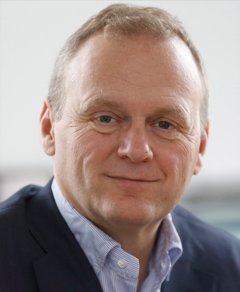Researcher Database

Prof. Dr. Hubert Serve
Department of Medicine 2
Theodor-Stern-Kai 7
60590 Frankfurt am Main
Programs
Clinical Communication Platform (CCP)
Exploitation of Oncogenic Mechanisms (EOM)
Molecularly Targeted Therapy (MTT)
Summary
Cancer and Leukemia is the result of multiple genetic and epigenetic alterations that fundamentally change the way how cells react in their environment. Decisions on differentiation and self-renewal, on proliferation, survival or quiescence, autophagy and cell death, or on metabolic wiring are made differently by cancer and leukemia cells than by their normal counterpart. These decisions are governed by the selection pressure and driven by the exquisite genetic and epigenetic plasticity of the malignant cells, and they often result in clonal heterogeneity that represents the optimal form of adaptation in a changing environment.
In my lab, we focus on interactions of malignant myeloid (AML) and plasma cells (Multiple Myeloma) with their microenvironment. We are very interested in the question, how changes in the metabolic wiring make leukemic cells more or less responsive to environmental stimuli, such as cytokine stimulation, cell-cell interactions or to toxic agents like cytotoxic drugs that are used in the clinics to fight hematological malignancies.
My lab is embedded into the vibrant environment of the Hematology/Oncology Department at the University of Frankfurt, which I direct, and into multiple activities of the local and national operations of the DKTK. In addition to AML, we host groups within the Department that experimentally work on B cell neoplasms, and selected solid tumors as lung cancer and head and neck cancer.
Clinically, our department has an excellent international reputation for the treatment of both, Acute lymphoblastic leukemia (ALL) and Acute myeloid leukemia (AML). For both diseases, we either coordinate the only National trial group (GMALL, headed by Nicola Gökbuget) or we are part of the leadership of such trial groups (SAL, coordinated by Gerhard Ehninger in Dresden together with Wolfgang Berdel from Münster and myself). In addition, we are a large referral center for all hematological malignancies with a large allogeneic stem cell transplantation unit and have a very active lung cancer program.
Personally, I am very much involved in central structures in oncology in Frankfurt. I coordinate the Oncology and Cancer Research activities of our faculty, I am a Scientific Cancer Center Director and I am the local coordinator of the Frankfurt/(Mainz site of the German Cancer Consortium (DKTK).
DKTK Junior Group Leader for Cancer Systems Biology
Single-cell approaches have not only revealed a wide variety of cell states, characterized by cells exhibiting striking differences in their transcriptional profile, but have also illuminated the mechanisms underlying state transitions in health and disease. Cellular plasticity and adaptive state changes have recently emerged as a basis for therapeutic resistance in cancer, and a better understanding of how cell state transitions are regulated is critical to develop therapeutic approaches that can overcome therapy resistance.
Our research focuses on understanding the mechanisms driving non-genetic cellular heterogeneity and therapy resistance in malignancy. Using novel single-cell sequencing approaches, we seek to develop new experimental and computational strategies to define altered cell states in both, cancer and immune cells. Our aim is to leverage a data driven strategy combined with single cell genomics and systems biology to address the challenges posed by heterogeneity in cancer, and to develop new strategies to overcome it, with the aim of translating laboratory-based findings into the clinic.